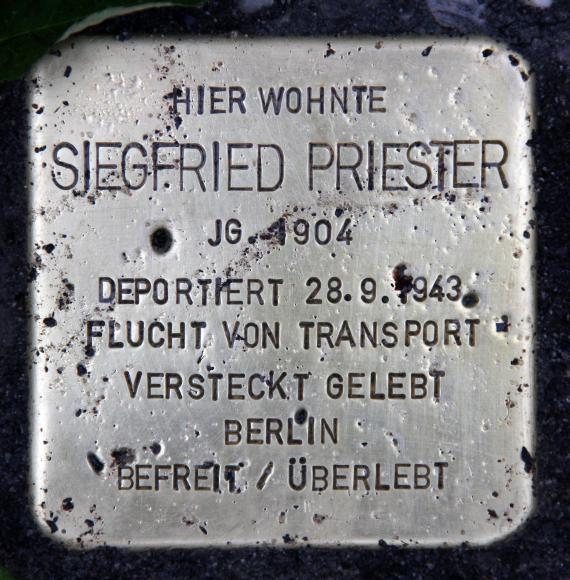Complete profile
90
Kategorie
Adresse
Wielandstraße 22
12159 Berlin
Germany
Koordinate
52.4698914, 13.3387987
Siegfried Priester was born in Berlin on December 28, 1904, the son of Hugo Priester and his wife Rosalie, née Schkud. He became a textile merchant. His father died in 1922, his mother moved with him and his sister Margarethe to Wielandstraße 22. His sister Margarethe was still able to emigrate to England, his mother was deported to Theresienstadt on August 5, 1942. After his mother's deportation, Siegfried Priester continued to live in the apartment at Wielandstraße 22 until the baker from the house diagonally across the street turned him in to the Gestapo. His name was on the deportation list of September 28, 1943 (the 43rd Osttransport) from Berlin to Auschwitz. How and when he escaped is unclear: either he fled during a stopover across an open field or upon arrival at Auschwitz, or, more likely, he fled when those destined for deportation had to board the railroad cars at Grunewald station. He is said to have hidden in the foliage colony there. He survived in hiding. During the day, he stayed with a Schleiermacher family who were in the wholesale business. Mr. Schleiermacher was non-Jewish, his wife Jewish. Siegfried Priester had to hide at night; he knew of seven or eight safe places to spend the night. Since he had no ration cards, he was fed by the Schleiermacher family. Other people helped him to survive; for example, he was able to hide in a hut during the day for a year in the bed store of a Mrs. Elisabeth Sterzl in Hildegardstraße. At the beginning of 1945, he received a photo ID from the company Ehlermann & Weckmann, which identified him as Paul Andretzky, who worked as a sales manager in the armaments factory. He never wore a Jewish star, at least once he got into a check without papers, but was able to talk his way out of the difficult situation with skill. In the underground, Siegfried met the non-Jewish Marianne, whom he married after the war; he lived with her on Rüdesheimer Platz, and a daughter was born to them in August 1950. Siegfried Priester ran a wholesale fabric business. He did not talk to his family about his experiences during the Nazi regime. The baker who ratted him out is said to have offered him a loaf of white bread as compensation after the end of the Second World War in 1945, but he refused. In 1948, the baker was sentenced to three years imprisonment in a criminal trial. Siegfried Priester died in Berlin on December 9, 1968. His daughter married, had two children and lives today in Berlin.
Medien
Stolperstein Wielandstr 22 (Schön) Siegfried Priester

Aufnahmedatum
2013-11-30
Fotografiert von
OTFW, Berlin
Import
Bildquelle (Woher stammt das Bild)
Selbst fotografiert
Breite
2048
Höhe
2083
Lizenzhinweise
Creative Commons Attribution-Share Alike 3.0
Lizenz
CC BY-SA 3.0
Beschreibung
Stolperstein, Siegfried Priester, Wielandstraße 22, Berlin-Schöneberg, Germany
Partner Link
Redaktionell überprüft
Aus
Partner Term
Add new comment